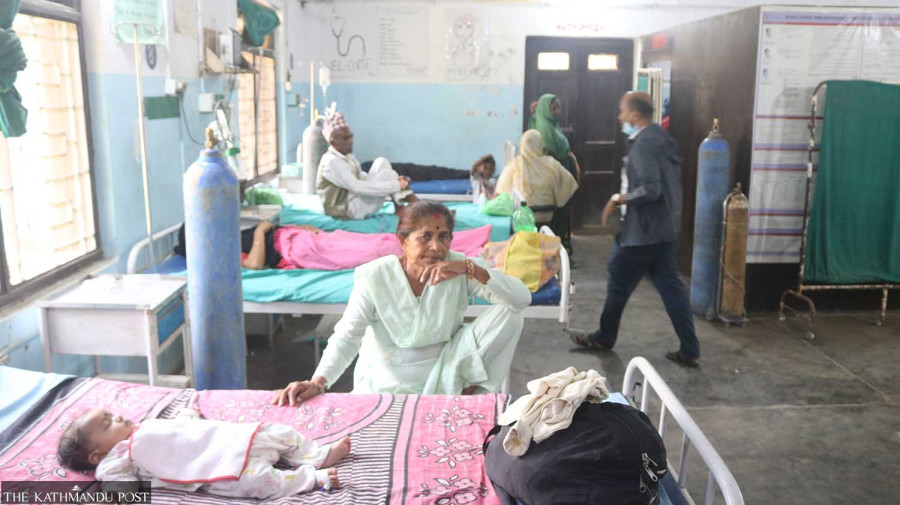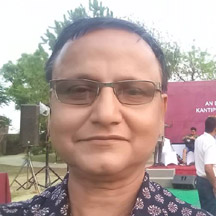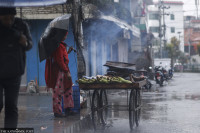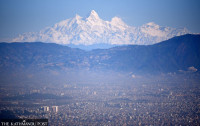Climate & Environment
Hot weather makes life difficult in Tarai
Schools in most Tarai districts close.
Rupa Gahatraj, Kamal Panthi & Sanju Paudel
Gulariya Municipality in Bardiya on Tuesday announced the closure of all schools for five days. Several schools in the municipality had reported students falling sick in the classrooms due to extremely hot weather conditions over the past two weeks.
On Sunday, five students of Dhruva Secondary School in Tulsipur, Gulariya Municipality-4, fainted during lessons. Pitambar Pokhrel, principal of the school, said the students regained consciousness shortly. “Our students have been complaining of various health issues such as nausea and vomiting due to heat exhaustion,” said Pokhrel.
Schools in Bardiya run from 10 am to 4 pm. According to Matiram Sharma, principal of Bagalamukhi Radhakrishna Tharu Secondary School in Gulariya-6, the physical infrastructure of community schools offers no protection from hot or cold weather leading to distressing conditions inside the classrooms during peak summer and winter.
“The school has a tin roof. During the day the temperature inside the classroom is higher than outside causing suffocating conditions,” said Sharma. “In the past few weeks, we have had to send around 30 students home after they fell sick in classrooms.”
According to Satish Yadav, head of the education unit of Gulariya Municipality, there are 47 community schools and 13 private schools in the municipality. Around 50 percent of the schools have tin roofing, which creates distressing conditions for both students and teachers.
“We were planning to close all the schools in the municipality after completing the vaccination of rubella and measles, which started on Monday, but after several students in the schools started falling ill on a daily basis due to extreme heat, the municipal office has closed schools for five days. The school closure could be extended if the temperature remains the same,” said Yadav.
Bardiya has been recording above 40 degrees Celsius almost regularly this summer.
Nepalgunj, in Banke district of the province, one of the hottest places in the country, where the temperature reaches 42 to 45 degrees Celsius during peak summer, has closed all schools until June 15.
According to a notice issued by the Nepalgunj Sub-Metropolitan, they postponed reopening of schools on June 11 as planned after a five-day break. The sub-metropolis plans to reopen schools on June 15, but has decided to cut back school hours by running classes only in the morning.
Nepalgunj recorded a maximum of 41.3 degrees Celsius on Tuesday, according to the Meteorological Forecasting Division.
Dr Sanket Kumar Risal, information officer at the Bheri Hospital in Nepalgunj, informs that more than 50 children have been visiting the outpatient department of the hospital every day in the past two weeks.
Dr Roma Bora, paediatrician at the Kanti Arogya Hospital in Nepalgunj, also said that nearly 20 children visit the hospital every day. "Most of the patients visiting the hospital complain of headaches, dizziness, fever, dry skin, nausea, and vomiting,” she said. “Most of the children are under the age of 16.”
Extreme weather events—excessive rainfall in a short time, continuous rain for several days post-monsoon, dry spells and droughts—have become more frequent in Nepal in recent years.
In the Tarai region, extremely hot weather conditions have affected students, farmers, and daily wage workers.
Setu Yadav, a 60-year-old farmer and vegetable seller from Shuddhodhan Rural Municipality Ward 7, in Rupandehi of Lumbini province who has a family of six, makes his living by selling seasonal vegetables on his bicycle. On normal days, he travels around 30 km carrying vegetables, but the heat has made it difficult for him to cover the distance to the market.
“Due to the intense heat, people haven’t been coming out to the market area so I haven’t been able to sell much,” said Yadav. “I don’t have my own land. I cultivate vegetables on a piece of land that I have taken on lease. With such a low income these days, I am even struggling to pay the land rent. There is no sign of rain, and if the temperature remains the same, I may have to stop selling vegetables and rest at home. I can’t afford to get sick.”
Govinda Rijal, another farmer from Tilottama Municipality ward 6, is worried about his financial condition this year fearing a crop failure. “Ever since I planted the paddy seeds, I have been irrigating the field with tubewell water. If it does not rain in the next few days, my paddy yield will be nil this year,” said Rijal. According to him, he hasn’t been able to find workers to employ in his fields this summer because of the extreme heat. “Even if I find someone to work in the fields, they cannot work due to the scorching sun. Those who work in offices are not affected by the weather, but things are extremely difficult for people like us who have to work outdoors.”




 19.12°C Kathmandu
19.12°C Kathmandu













